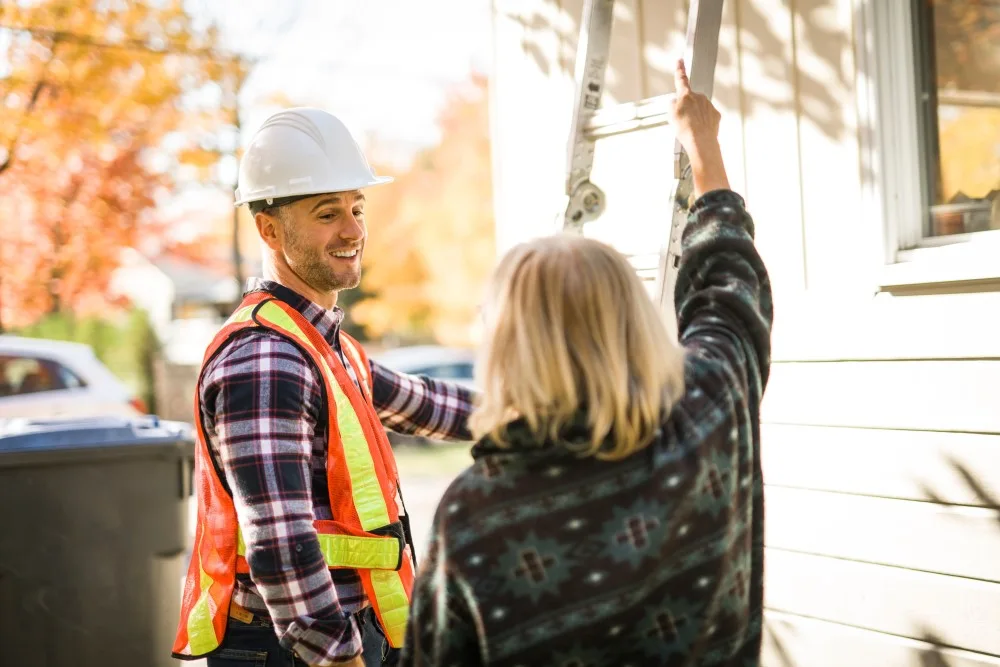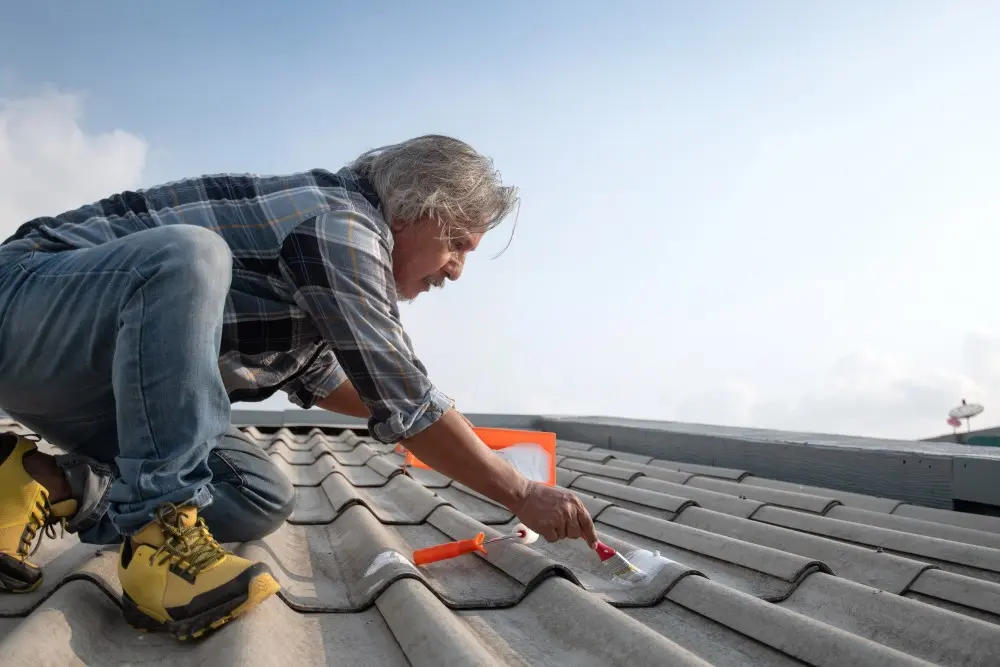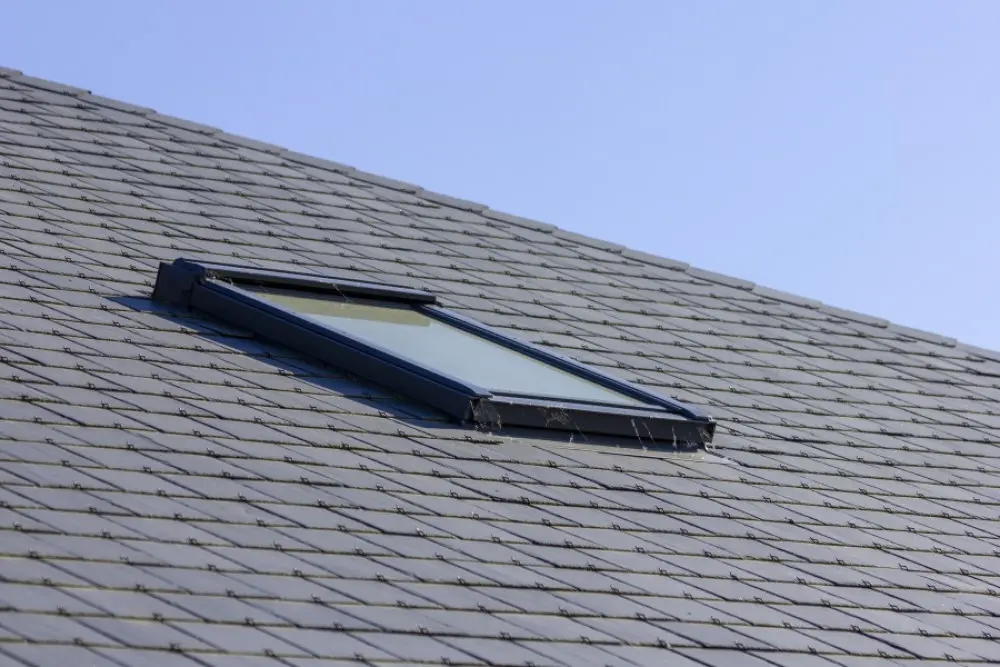What's Covered vs. What's Not: Tennessee Roof Leak Insurance Coverage
Simply put, your homeowners' insurance coverage for roof leaks depends entirely on what caused the damage. Many insurance companies follow standard practices, separating sudden accidental damage from gradual wear issues. Tennessee insurance policies typically covered sudden roof damage from specific covered perils, while excluding damage from poor maintenance or normal wear.
When your roof leak results from a covered peril, your home insurance company may cover costs for several types of damage and expenses. The dwelling coverage portion of your standard homeowners insurance policy typically includes both direct roof damage and related losses from the covered incident.
- Emergency mitigation: Professional tarping to prevent further damage.
- Roof repairs: Partial or complete roof repair, depending on the extent of the damage.
- Interior damage: Water damage to drywall, flooring, personal belongings, and structural elements.
- Additional living expenses: Temporary housing if your home becomes uninhabitable.
However, you can expect deductibles and coverage limits to apply to all of your roof leak claims.
Factors That Impact Your Roof Coverage

Several key factors determine whether your insurance company will approve your roof leak claims and how much they'll pay. For example, the age of your roof significantly affects coverage decisions, with insurance carriers often applying different standards to older roofs, sometimes requiring actual cash value coverage rather than replacement cost for roofs over 15-20 years old.
- Roof age: Older roofs may receive ACV coverage instead of full replacement cost.
- Maintenance history: Well-documented roof maintenance supports successful claims.
- Previous claims: Multiple recent insurance claims can trigger stricter scrutiny.
- Policy type: Standard homeowners insurance policies vary in roof coverage generosity.
- Deductible amount: Higher deductibles reduce claim frequency but increase out-of-pocket costs.
- Local weather patterns: Areas with frequent storm damage may face higher scrutiny.
Together, these factors determine your final settlement. A well-maintained newer roof with documented care typically receives more favorable treatment than an old roof with deferred maintenance, even when both suffer similar covered damage.
Understanding Coverage Types: ACV vs. RCV
The type of coverage in your homeowners insurance policy dramatically affects your payout for roof damage. Most Tennessee homeowners choose between actual cash value and replacement cost coverage, as each offers different financial outcomes for roof leak claims.
Actual Cash Value (ACV) Coverage
ACV coverage pays the depreciated value of your damaged roof based on age and condition. For example, if your 15-year-old roof originally cost $20,000, but the current actual cash value reflects $12,000 after depreciation, ACV coverage pays up to $12,000 minus your deductible. This means you receive less money for older roofs due to depreciation calculations.
Replacement Cost Value (RCV) Coverage
RCV coverage pays the full repair cost to restore your roof using similar roofing materials, regardless of depreciation. Using the same example, RCV coverage would pay up to $20,000 for replacement costs minus your deductible. However, many policies pay ACV initially, then pay the remaining replacement cost after you complete the repairs and submit receipts.
While RCV coverage costs more in insurance premiums, it offers substantially better protection for major roof repairs or complete roof replacement. This is especially the case for older homes where depreciation significantly reduces ACV payouts.
A Step-by-Step Claims Process for Roof Leaks
To handle the claims process successfully, you’ll need to act quickly and document thoroughly. Tennessee law under Code Annotated § 56-7-105 requires insurance companies to make coverage decisions within 60 days of receiving complete documentation.

Step 1: Ensure Safety and Prevent Further Damage
First things first, ensure you address safety concerns immediately and protect your property from additional water damage. Place buckets to catch dripping water, move furniture and belongings away from affected areas, and cover exposed areas with tarps or plastic sheeting.
Step 2: Document Everything Thoroughly
Take detailed photos and videos of all damage. Document everything systematically:
- Exterior roof damage: Missing shingles, damaged flashing, visible holes or cracks.
- Interior water damage: Ceiling stains, wall damage, and flooring issues.
- Personal belongings: Damaged furniture, electronics, clothing, and stored items.
- Structural issues: Sagging ceilings, warped floors, damaged drywall.
- Date and time stamps: Include timestamps on all photos and videos.
- Weather conditions: Document recent storms, wind speeds, and precipitation amounts.
Make sure to keep all damaged items until your insurance agent can inspect them.
Step 3: Contact Your Insurance Company
Report your claim within 24-48 hours of discovering the damage. Most Tennessee homeowners' insurance policies require prompt notification. Provide your policy number, a detailed explanation of the damage, and initial photos. Ask about your deductible amount and coverage limits.
Step 4: Schedule Professional Inspection
Next, contact a licensed roofing contractor for professional damage assessment. A thorough inspection helps you understand the full scope of roof damage and provides proper documentation for your insurance carrier. Professional contractors can identify damage that homeowners might miss and provide detailed reports that support your claim.
#cta_here
Step 5: Meet with an Insurance Adjuster
Coordinate with your insurance company's adjuster for property inspection. You’ll want to be there during the inspection, provide all documentation, and ensure the adjuster sees all damage areas. Upon completion, request a copy of their report and feel free to ask any questions about coverage determinations.
Step 6: Review Settlement Offer
Carefully examine your insurance company's settlement offer. Compare it with professional contractor estimates and verify that all damage is included. If you disagree with the assessment, you can request reinspection or hire a public adjuster.
Step 7: Complete Authorized Repairs
Choose a qualified, licensed contractor to complete any necessary repairs. Ensure all of their work meets local building codes and manufacturer specifications. Don’t forget to keep all receipts and documentation for the final claim settlement.
What to Do If Your Claim Is Denied
Claim denials happen frequently, but don’t get frustrated. Tennessee homeowners have several options to challenge unfavorable decisions. If you understand your rights and available actions, you can often reverse initial denials or at least increase settlement amounts significantly.
- Review the denial letter carefully: Read the denial letter carefully. Look for reasons like lack of maintenance, exclusions, or missing documents. If it seems unfair, gather more evidence and check your policy wording.
- Hire a public adjuster: A public adjuster works for you, not the insurer. They can reassess the damage and negotiate on your behalf. In Tennessee, they may charge up to 10 percent of your settlement.
- File a state complaint: Think the denial was wrong? File a complaint with the Tennessee Department of Commerce and Insurance. They investigate unfair claim practices and can help reopen claims.
- Seek legal consultation: For large losses or bad faith denials, speak with a lawyer who knows Tennessee insurance law. They can explain your rights and push back against unfair practices.
Although it’s frustrating, you don’t have to accept the first denial as final. We’ve seen many initially denied claims receive approval after a proper appeal with additional documentation or professional representation.
Working with Tennessee Roofing Contractors
The right roofing contractor affects both repair quality and insurance claim success. Tennessee's post-storm environment attracts both legitimate contractors and roofing scams, making careful contractor selection pivotal for homeowners dealing with roof leak claims.
Selecting Qualified Contractors

The right contractor will protect your investment and ensure quality work that meets insurance company standards. Look for established local businesses with proper credentials and solid reputations in handling insurance claims.
- Tennessee licensing: Verify current state licensing and local permits for all proposed work.
- GAF certified roofing contractors: Look for premium manufacturer certifications indicating superior training.
- Local reputation: Choose established businesses with strong community presence and references.
- Insurance and bonding: Ensure contractors carry liability insurance and workers' compensation coverage.
- Written estimates: Request detailed written estimates outlining materials, labor, and timeline.
Red Flags to Avoid
Protecting yourself from fraudulent contractors prevents additional financial losses during an already stressful situation. Storm chasers often target areas after severe weather events.
- Door-to-door sales: Be extremely cautious of contractors who knock on doors immediately after storms.
- Upfront payment: Never pay large amounts before work begins; legitimate contractors don't require full payment upfront.
- Deductible waiving: Contractors offering to waive deductibles commit insurance fraud under Tennessee law.
- High-pressure tactics: Avoid contractors who pressure you to sign contracts immediately or create a false sense of urgency.
- No local presence: Skip contractors without proper licensing or established local business addresses.
Understanding roof repair cost factors helps you evaluate contractor estimates and make the ideal decision about repair versus replacement options.
How to Prevent Roof Leaks: Our Tips
Regular maintenance is one of the easiest and most effective tactics in preventing roof leaks and building a record that supports future insurance claims. Simple tasks can extend your roof’s life and stop minor issues from turning into major, costly problems. The best time to replace a roof often depends on maintenance history and current condition.

- Annual inspections: Inspect your roof annually for damaged shingles, loose flashing, and potential problem areas that could develop into leaks.
- Clean gutters regularly: Maintain proper drainage by cleaning gutters and downspouts seasonally to prevent water backup and ice dam formation.
- Trim tree branches: Remove overhanging branches that could fall during storms and cause roof damage that requires insurance claims.
- Flashing maintenance: Check and maintain flashing around chimneys, vents, skylights, and roof penetrations where leaks commonly develop.
- Attic ventilation: Ensure adequate attic ventilation to prevent moisture buildup and ice dam formation during winter months.
If you’re consistent with roof maintenance, it creates a paper trail demonstrating proper care, which insurance companies value when evaluating claims. Another bonus is that well-maintained roofs generally receive more favorable claim treatment than neglected ones, and understanding roofing lifespan helps you plan maintenance schedules effectively.










